-
-
[原创]cython逆向-语言特性分析
-
发表于: 2024-6-21 21:12 8921
-
之前遇到的很多python题目逆向都是pyc的逆向比较简单,最近遇到了很多cython的题目,但是不太清楚原理做的就很难受,这里就想梳理一下cython的原理
这里引自官方文档:
Cython - an overview — Cython 3.1.0a0 documentation
Cython是一种编程语言,可以编写 C 扩展 对于 Python 语言来说,就像 Python 本身一样简单 它旨在成为 语言的超集,赋予它高级, 面向对象、函数式和动态编程。
主要的 Python 执行环境通常称为 CPython用 C 语言编写的。 其他主要实现使用 Java 和 Python 本身 。
它的主要特点 :
Cython 项目最初基于著名的 [Pyrex Pyrex] 已经通过源代码编译器解决了这个问题 将 Python 代码转换为等效的 C 代码
特性:
与大多数 Python 软件不同,Cython 需要在系统上存在 C 编译器
GNU C 编译器(gcc)通常存在,或通过包系统轻松获得
在 Ubuntu 或 Debian 命令:
木有apple,所以自己官网看
https://developer.apple .com /
使用开源 MinGW(Windows 的 gcc 分发版)
解压缩 tarball 或 zip 文件,输入目录
再运行
跟着无名侠仙贝学习Cython Reverse - Pandaos's blog (panda0s.top)
Cython 有一个个功能可以将 Python 编译成 C语言实现,再由 GCC/Clang 将 C 编译成动态库
build的源码:
annotate=True 选项可以生成一个 html 页面
==显示 Py源码与生成的C代码的对应关系==
build命令:
成功后在当前目录下找到对应的动态库与对应的 xxx.c 源文件
==直接用 python import 导入==
版本: Python 3.7.6,Cython 0.29.21

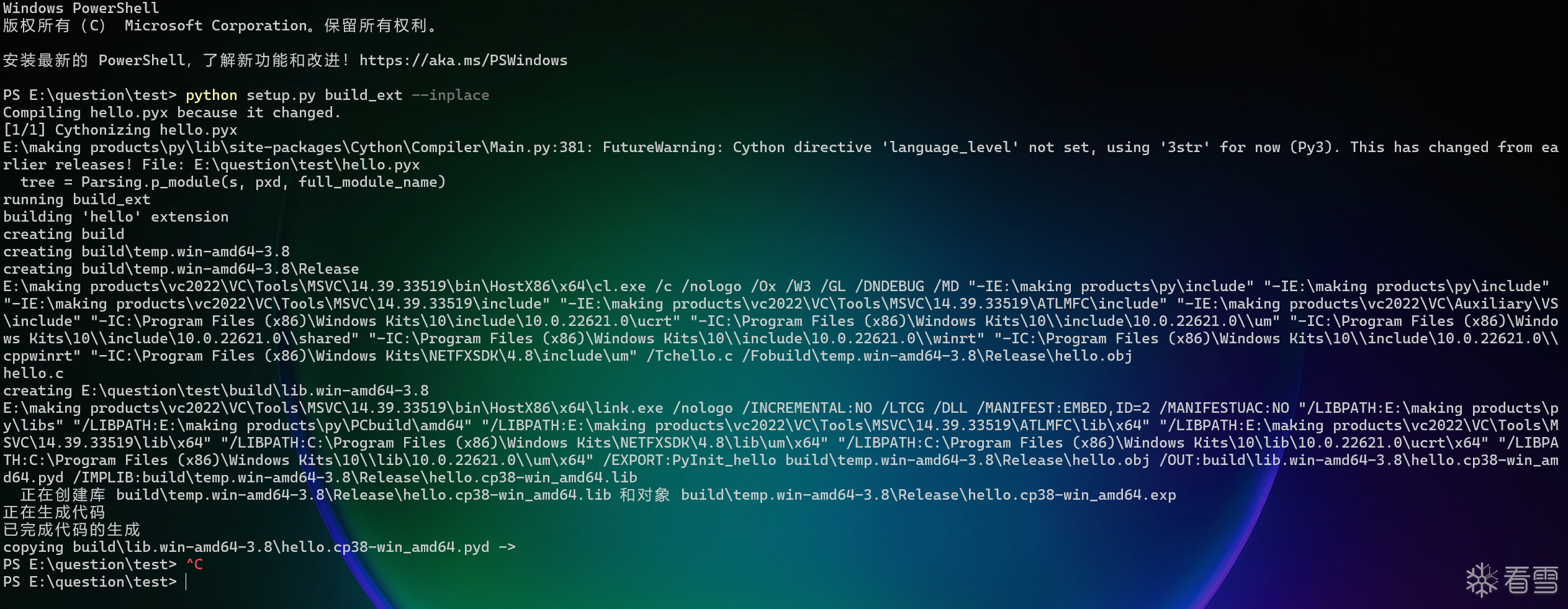
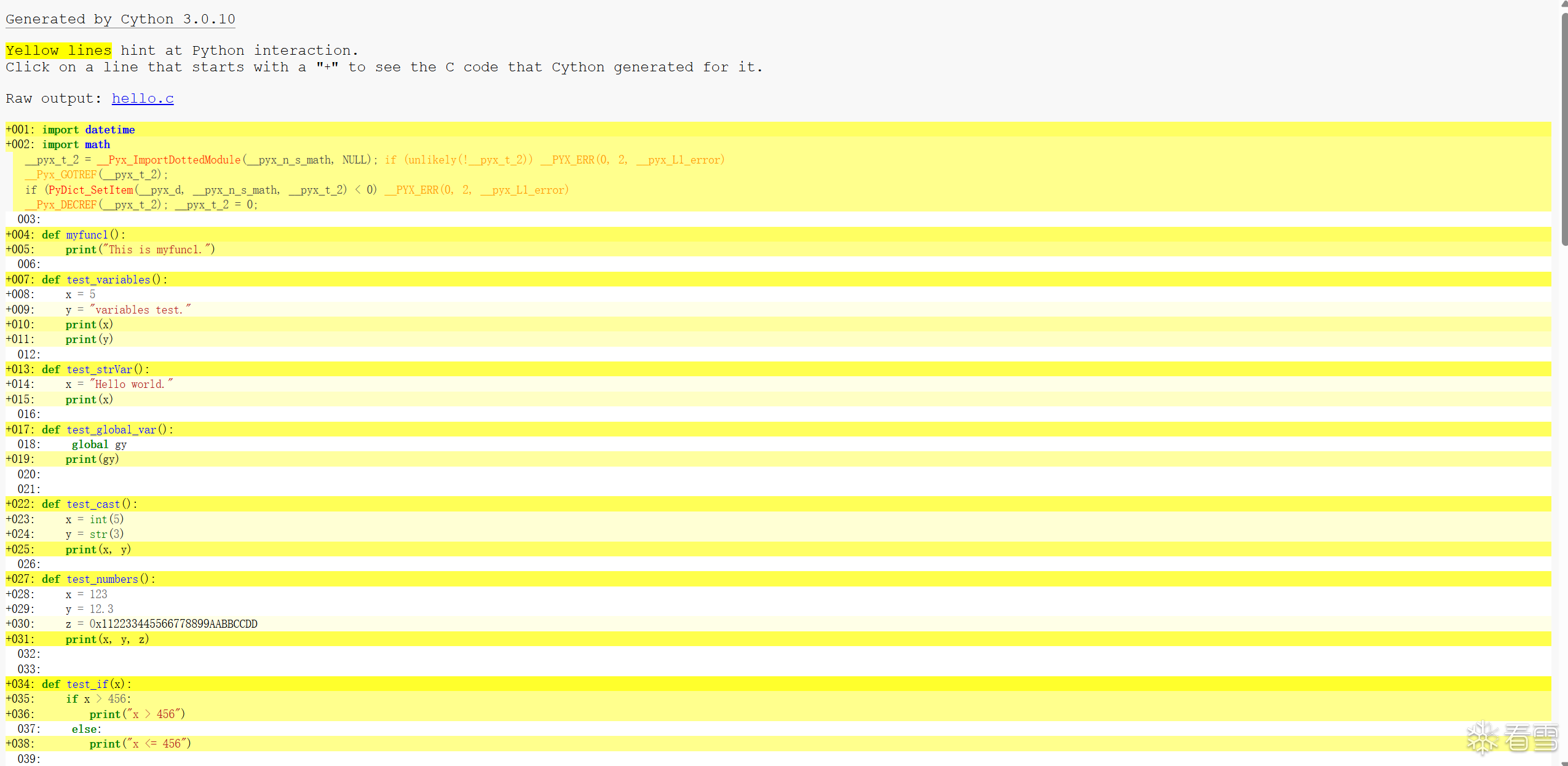
在pyx文件编译为.c的文件时,__pyx_string_tab是一个包含代码中所有需要使用的字符串(避免重复创建相同的字符串,从而优化字符串的使用和查找)
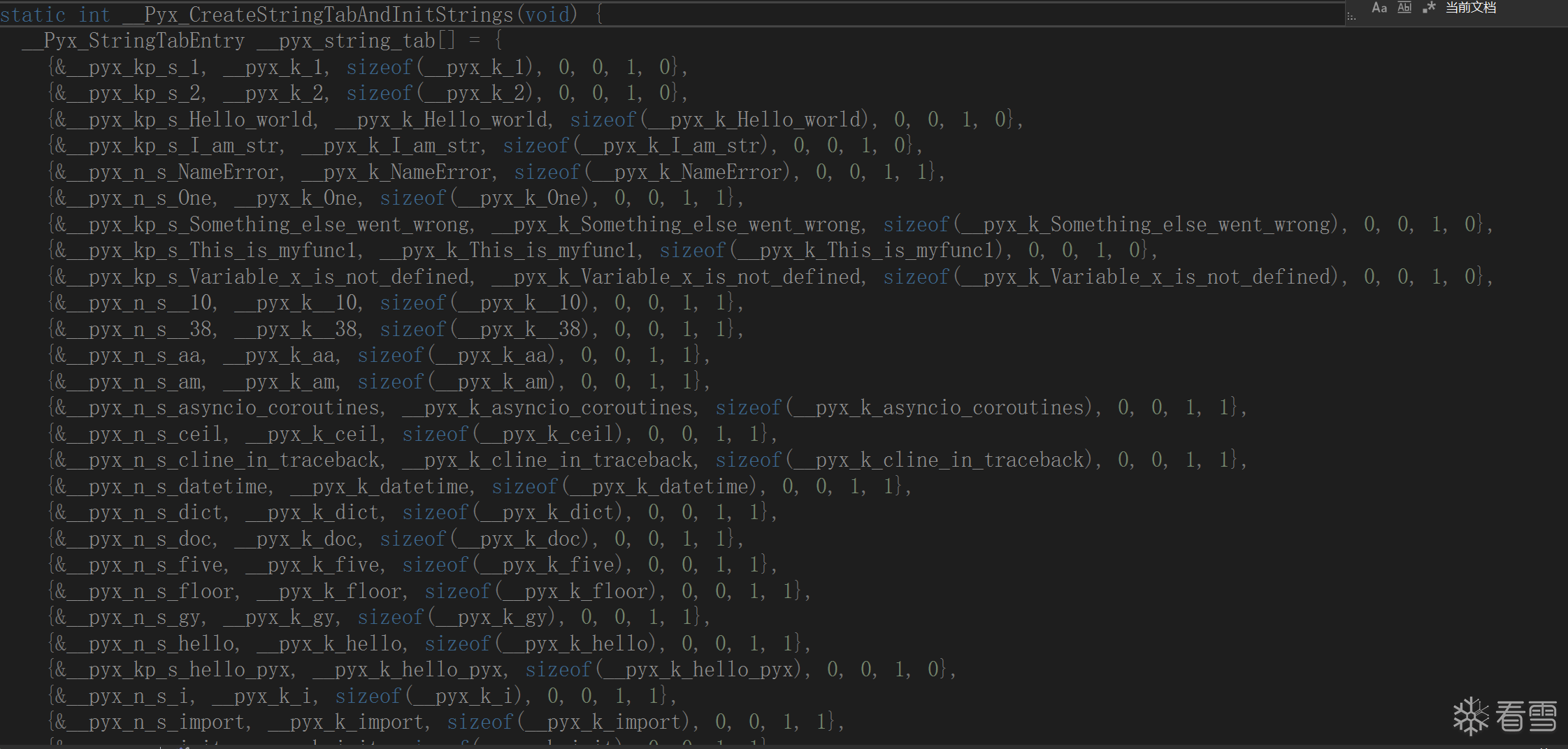
__pyx_string_tab将字符串与PyObject联系,再调用
__Pyx_InitStrings初始化字符串对象(详解__Pyx_InitStrings使用)
C++ __Pyx_InitStrings函数代码示例 - 纯净天空 (vimsky.com)
在逆向时,可以通过这个特性快速找到对应的project
我在审计的时候发现了__Pyx_StringTabEntry结构体,发现和前面的__pyx_string_tab数组有点关系分析一下
如下:
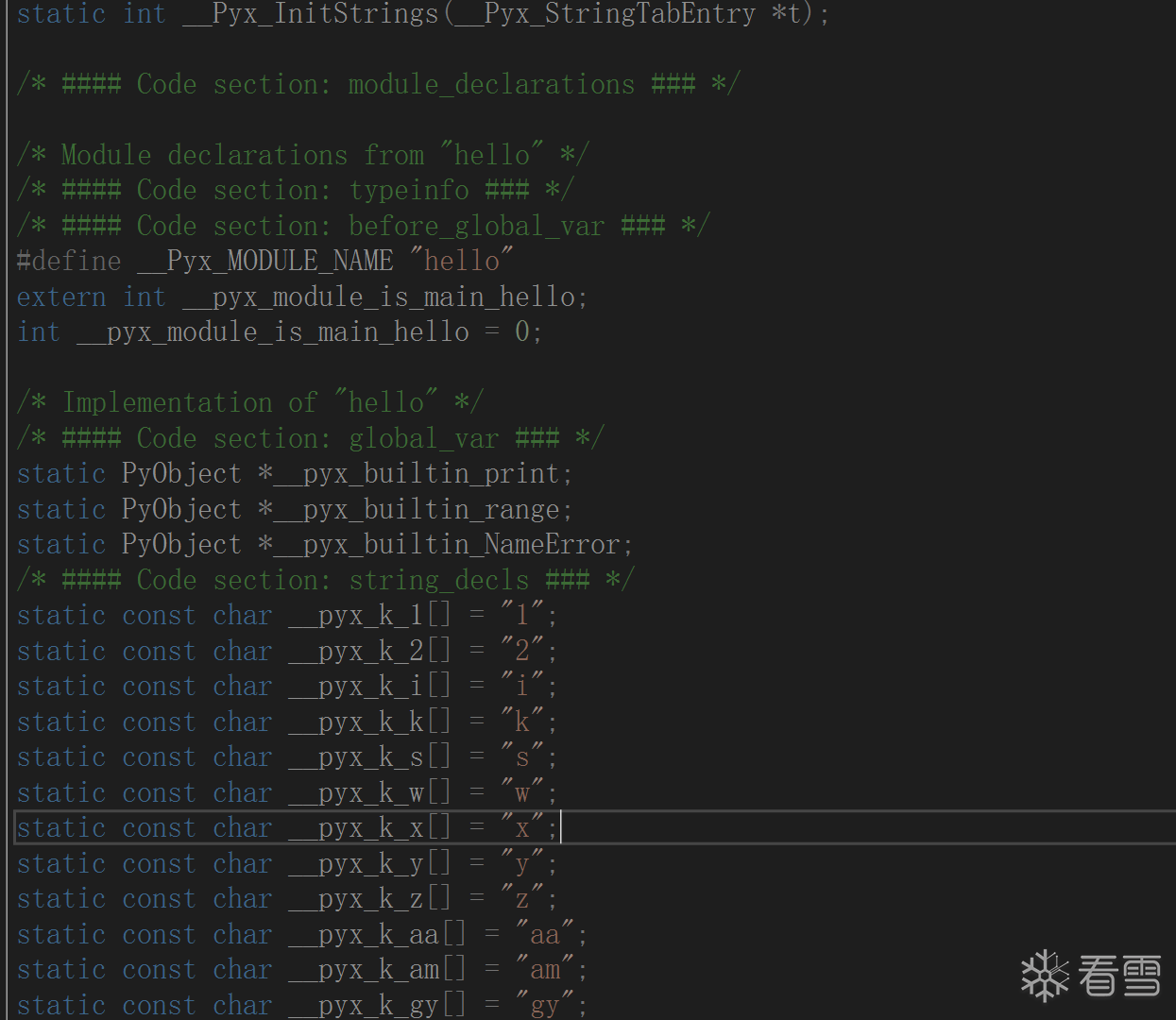
cython代码大致结构
完整的实现
在模块初始化过程中,Cython 会调用一个函数(如 __Pyx_InitStrings),使用 __pyx_string_tab 来初始化所有字符串常量,
然后这个函数遍历 __pyx_string_tab,初始化每个字符串条目,并将字符串对象的指针存储在相应的结构体字段中
整数常量的构造涉及将 Python 代码中的整数常量转换为 C 代码中的相应表示形式。这包括处理各种整数类型(如短整型、整型、长整型和超长整型)以及确保在生成的 C 代码中正确初始化和使用这些常量
在cython是可以直接引用
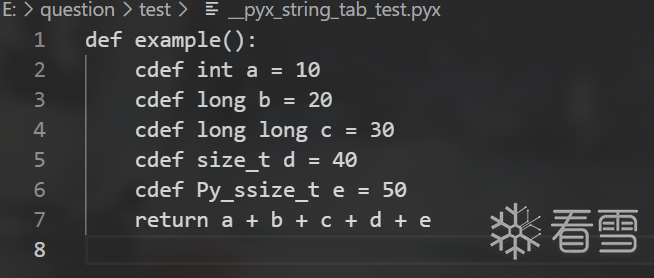
但是转化为c代码时,类似于(简化版本)
超出 C 的基本整数类型范围的整数,Cython 使用 Python 的 PyLong 类型来表示
例如:
转换
整数属于全局变量,在 __Pyx_InitGlobals 中初始化

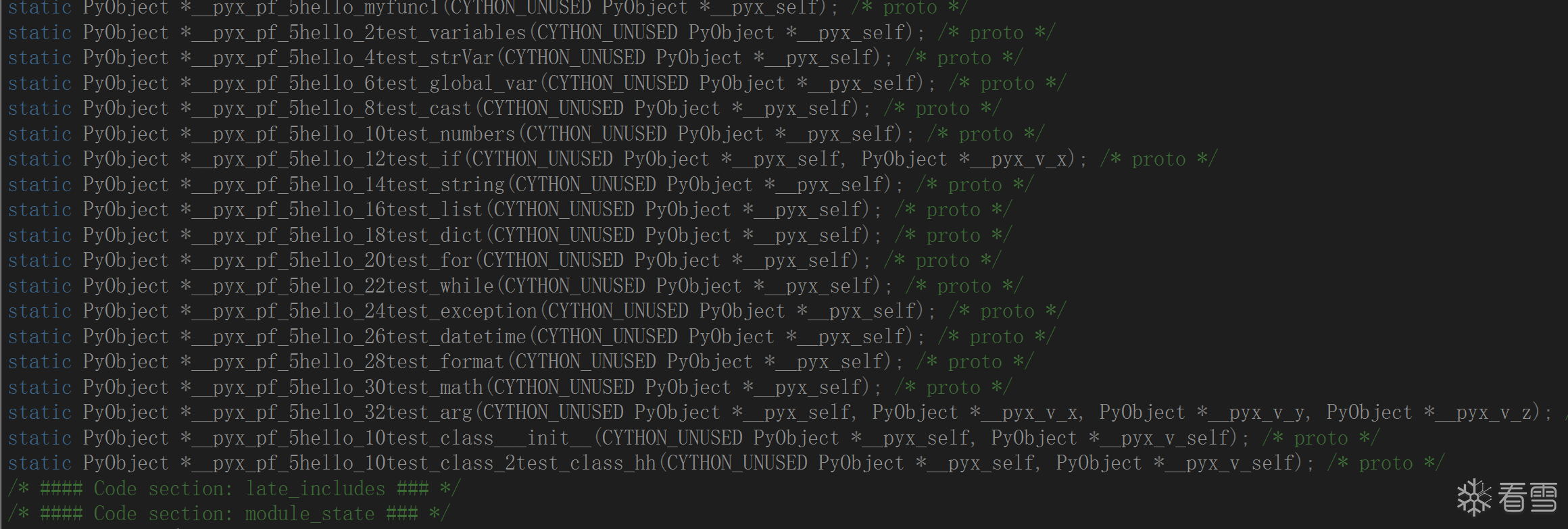
这个函数对应于 Python 定义的函数 test_arg(x, y, z),它在 Cython 中被编译成如下形式:
在 Cython 编译过程中,这个 Python 函数被转换为 C 函数,形式如下:
通常在 Cython 中用作占位符,因为函数没有 self`参数
对应于 Python 函数参数 x, y, z`的 C 对象
这个函数对应于一个类方法 test_class.test_class_hh,其 Python 定义如下:
在 Cython 编译过程中,这个类方法被转换为 C 函数,形式如下:
通常在 Cython 中用作占位符,因为方法没有 self参数
对应于 Python 方法中的 self参数的 C 对象
字符串常量 __pyx_kp_s_This_is_myfunc1被初始化为 "This is myfunc1."
创建包含该字符串的元组:
前面我们提到了回收站机制,这里详细解释cython中严格处理的回收站的机制
引用计数:
标记-清除(Mark and Sweep):
转换为cython代码
这里关于def函数的定义比较冗杂,简单看看就行
这里关于def的函数定义就不再解析了,大体差不多
主要解析这里引用字符串和调用print的函数
__builtin__是cython中的一个内置模块:
包含所有的内置对象,函数,异常,常量(提供一组标准的内置对象,会自动加载的这个模块,不会在用户处显示的导入),比如
函数:print,len,range
异常:Exception,TyprError
常量:none,true,false
查看这个地方构造元组的汇编
分析cython的实现
详细说明:
这个地方的4是指比较操作符的代码,gpt的解释有问题,这里在官方文档中找到关于他的使用
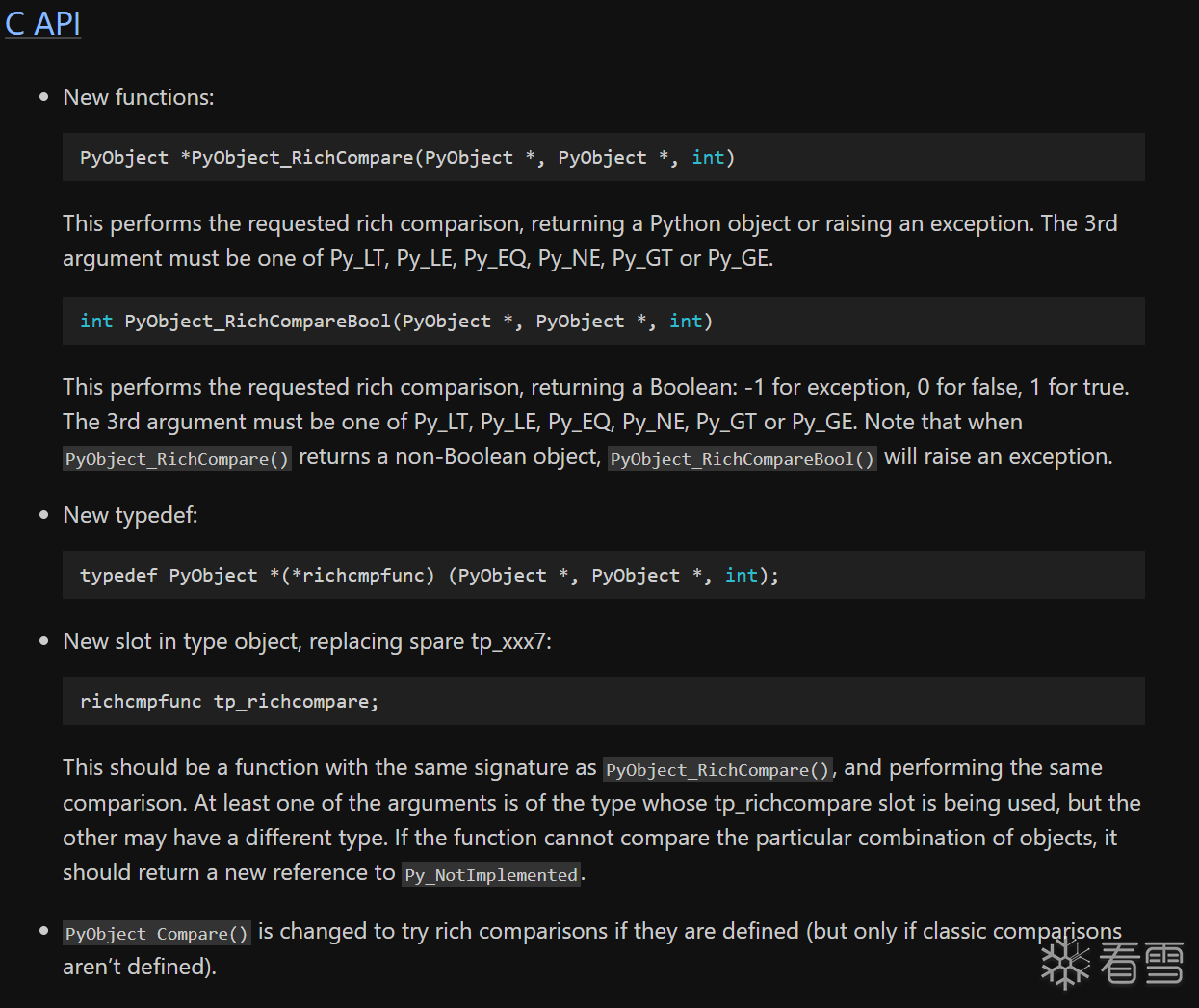
简单来说就是一个比较函数,返回一个布尔值(异常返回-1,结果为假0,为真返回1)
第三个参数的op为6种比较操作符之一
从一个序列(如列表、元组或字符串)中提取一个子序列
通过__Pyx_PyObject_GetSlice辅助函数
__pyx_v_x: 这是需要进行切片操作的 Python 对象
2: 这是切片操作的起始索引。即,从索引 2 开始进行切片
0: 这是切片操作的结束索引(0一般表示切片一直进行到对象的末尾)
&__pyx_slice__4代表一个包含切片信息的 PyObject,实际相当于 slice(2, None)
start: 切片开始的索引(包括)
stop: 切片结束的索引(不包括)
step: 步长,表示从 start 到 stop 之间每隔多少个元素取一个
示例:
索引访问只能获取单个元素,而不能获取多个元素或子序列
源码
对照源码分析
对照源码分析
对照源码分析
格式化字符串的汇编实现
动态调用 Python/C API 中的函数来实现在运行时获取 PyObject 指针对应的字符串表示形式的 UTF-8 dump 信息
==根据python将对象转换为UTF-8字符串的汇编实现,编译frida的脚本==
脚本实现
sudo apt-get install build-essential
sudo apt-get install build-essential
pip install Cythonpip install Cythonpython setup.py installpython setup.py installpip install cython setuptoolspip install cython setuptoolsfrom setuptools import setup
from Cython.Build import cythonize
setup( ext_modules = cythonize("hello.pyx", annotate=True)
)from setuptools import setup
from Cython.Build import cythonize
setup( ext_modules = cythonize("hello.pyx", annotate=True)
)python setup.py build_ext --inplace
python setup.py build_ext --inplace
import datetimeimport mathdef myfunc1(): print("This is myfunc1.")
def test_variables(): # 定义局部变量并打印
x = 5
y = "variables test."
print(x)
print(y)
def test_strVar(): # 定义字符串变量并打印
x = "Hello world."
print(x)
def test_global_var(): # 使用全局变量 gy 并打印
global gy
print(gy)
def test_cast(): # 类型转换:将整数和字符串进行类型转换并打印
x = int(5)
y = str(3)
print(x, y)
def test_numbers(): # 打印整数、浮点数和大整数(十六进制)
x = 123
y = 12.3
z = 0x112233445566778899AABBCCDD
print(x, y, z)
def test_if(x): # 条件语句:判断 x 是否大于 456
if x > 456:
print("x > 456")
else:
print("x <= 456")
def test_string(): # 字符串操作:获取长度、索引、切片,并检查子字符串
x = "I am str."
y = len(x)
z = x[1]
w = x[2:]
print(x, y, z, w)
if "am" in x:
print("yes")
else:
print("wrong")
def test_list(): # 列表操作:添加元素、遍历、切片和替换部分元素
x = list()
x.append(1)
x.append(2)
x.append(3)
x.append(4)
x.append("five")
print(x)
print(len(x))
for i in x:
print(i)
x = x[1:]
x[2:4] = [22, 33]
def test_dict(): # 字典操作:添加键值对、访问值、检查键和遍历字典
x = {}
x["one"] = 1
x["two"] = 2
x["three"] = 3
y = x["one"]
z = x["two"]
if "one" in x:
print(y)
for k in x:
print(k, x[k])
def test_for(): # for 循环:计算 0 到 100 的和
s = 0
for i in range(101):
s = s + i
print(s)
def test_while(): # while 循环:计算 1 到 100 的和
s = 0
i = 1
while i <= 100:
s = s + i
i += 1
print(s)
def test_exception(): # 异常处理:尝试执行错误操作并捕获异常
x = 1
try:
x = x + "1"
print(x)
except NameError:
print("Variable x is not defined")
except:
print("Something else went wrong")
def test_datetime(): # 获取并打印当前日期和时间
x = datetime.datetime.now()
print(x)
def test_format(): # 字符串格式化:使用 % 操作符进行字符串格式化
x = 1
y = "One"
z = "%s is %d" % (y, x)
print(z)
def test_math(): # 数学函数:使用 ceil 和 floor 函数
x = math.ceil(1.4)
y = math.floor(1.4)
print(x) # 返回 2
print(y) # 返回 1
def test_arg(x, y, z): # 传递参数:修改参数并打印
x = x + 1
y = y + "2"
z = z[:]
print(x, y, z)
class test_class:
# 定义一个类及其方法
def __init__(self):
self.aa = 1
def test_class_hh(self):
print(self.aa)
# 定义全局变量并调用所有函数gy = 123myfunc1()test_variables()test_strVar()test_global_var()test_cast()test_numbers()test_string()test_list()test_dict()test_for()test_while()test_exception()test_datetime()test_format()test_math()test_arg(1, "2", [4, 5, 6])
import datetimeimport mathdef myfunc1(): print("This is myfunc1.")
def test_variables(): # 定义局部变量并打印
x = 5
y = "variables test."
print(x)
print(y)
def test_strVar(): # 定义字符串变量并打印
x = "Hello world."
print(x)
def test_global_var(): # 使用全局变量 gy 并打印
global gy
print(gy)
def test_cast(): # 类型转换:将整数和字符串进行类型转换并打印
x = int(5)
y = str(3)
print(x, y)
def test_numbers(): # 打印整数、浮点数和大整数(十六进制)
x = 123
y = 12.3
z = 0x112233445566778899AABBCCDD
print(x, y, z)
def test_if(x): # 条件语句:判断 x 是否大于 456
if x > 456:
print("x > 456")
else:
print("x <= 456")
def test_string(): # 字符串操作:获取长度、索引、切片,并检查子字符串
x = "I am str."
y = len(x)
z = x[1]
w = x[2:]
print(x, y, z, w)
if "am" in x:
print("yes")
else:
print("wrong")
def test_list(): # 列表操作:添加元素、遍历、切片和替换部分元素
x = list()
x.append(1)
x.append(2)
x.append(3)
x.append(4)
x.append("five")
print(x)
print(len(x))
for i in x:
print(i)
x = x[1:]
x[2:4] = [22, 33]
def test_dict(): # 字典操作:添加键值对、访问值、检查键和遍历字典
x = {}
x["one"] = 1
x["two"] = 2
x["three"] = 3
y = x["one"]
z = x["two"]
if "one" in x:
print(y)
for k in x:
print(k, x[k])
def test_for(): # for 循环:计算 0 到 100 的和
s = 0
for i in range(101):
s = s + i
print(s)
def test_while(): # while 循环:计算 1 到 100 的和
s = 0
i = 1
while i <= 100:
s = s + i
i += 1
print(s)
def test_exception(): # 异常处理:尝试执行错误操作并捕获异常
x = 1
try:
x = x + "1"
print(x)
except NameError:
print("Variable x is not defined")
except:
print("Something else went wrong")
def test_datetime(): # 获取并打印当前日期和时间
x = datetime.datetime.now()
print(x)
def test_format(): # 字符串格式化:使用 % 操作符进行字符串格式化
x = 1
y = "One"
z = "%s is %d" % (y, x)
print(z)
def test_math(): # 数学函数:使用 ceil 和 floor 函数
x = math.ceil(1.4)
y = math.floor(1.4)
print(x) # 返回 2
print(y) # 返回 1
def test_arg(x, y, z): # 传递参数:修改参数并打印
x = x + 1
y = y + "2"
z = z[:]
print(x, y, z)
class test_class:
# 定义一个类及其方法
def __init__(self):
self.aa = 1
def test_class_hh(self):
print(self.aa)
# 定义全局变量并调用所有函数gy = 123myfunc1()test_variables()test_strVar()test_global_var()test_cast()test_numbers()test_string()test_list()test_dict()test_for()test_while()test_exception()test_datetime()test_format()test_math()test_arg(1, "2", [4, 5, 6])
static int __Pyx_CreateStringTabAndInitStrings(void) {
__Pyx_StringTabEntry __pyx_string_tab[] = {
{&__pyx_kp_s_1, __pyx_k_1, sizeof(__pyx_k_1), 0, 0, 1, 0},
{&__pyx_kp_s_2, __pyx_k_2, sizeof(__pyx_k_2), 0, 0, 1, 0},
{&__pyx_kp_s_Hello_world, __pyx_k_Hello_world, sizeof(__pyx_k_Hello_world), 0, 0, 1, 0},
{&__pyx_kp_s_I_am_str, __pyx_k_I_am_str, sizeof(__pyx_k_I_am_str), 0, 0, 1, 0},
{&__pyx_n_s_NameError, __pyx_k_NameError, sizeof(__pyx_k_NameError), 0, 0, 1, 1},
{&__pyx_n_s_One, __pyx_k_One, sizeof(__pyx_k_One), 0, 0, 1, 1},
{&__pyx_kp_s_Something_else_went_wrong, __pyx_k_Something_else_went_wrong, sizeof(__pyx_k_Something_else_went_wrong), 0, 0, 1, 0},
{&__pyx_kp_s_This_is_myfunc1, __pyx_k_This_is_myfunc1, sizeof(__pyx_k_This_is_myfunc1), 0, 0, 1, 0},
{&__pyx_kp_s_Variable_x_is_not_defined, __pyx_k_Variable_x_is_not_defined, sizeof(__pyx_k_Variable_x_is_not_defined), 0, 0, 1, 0},
{&__pyx_n_s__10, __pyx_k__10, sizeof(__pyx_k__10), 0, 0, 1, 1},
{&__pyx_n_s__38, __pyx_k__38, sizeof(__pyx_k__38), 0, 0, 1, 1},
{&__pyx_n_s_aa, __pyx_k_aa, sizeof(__pyx_k_aa), 0, 0, 1, 1},
{&__pyx_n_s_am, __pyx_k_am, sizeof(__pyx_k_am), 0, 0, 1, 1},
{&__pyx_n_s_asyncio_coroutines, __pyx_k_asyncio_coroutines, sizeof(__pyx_k_asyncio_coroutines), 0, 0, 1, 1},
{&__pyx_n_s_ceil, __pyx_k_ceil, sizeof(__pyx_k_ceil), 0, 0, 1, 1},
{&__pyx_n_s_cline_in_traceback, __pyx_k_cline_in_traceback, sizeof(__pyx_k_cline_in_traceback), 0, 0, 1, 1},
{&__pyx_n_s_datetime, __pyx_k_datetime, sizeof(__pyx_k_datetime), 0, 0, 1, 1},
{&__pyx_n_s_dict, __pyx_k_dict, sizeof(__pyx_k_dict), 0, 0, 1, 1},
{&__pyx_n_s_doc, __pyx_k_doc, sizeof(__pyx_k_doc), 0, 0, 1, 1},
{&__pyx_n_s_five, __pyx_k_five, sizeof(__pyx_k_five), 0, 0, 1, 1},
{&__pyx_n_s_floor, __pyx_k_floor, sizeof(__pyx_k_floor), 0, 0, 1, 1},
{&__pyx_n_s_gy, __pyx_k_gy, sizeof(__pyx_k_gy), 0, 0, 1, 1},
{&__pyx_n_s_hello, __pyx_k_hello, sizeof(__pyx_k_hello), 0, 0, 1, 1},
{&__pyx_kp_s_hello_pyx, __pyx_k_hello_pyx, sizeof(__pyx_k_hello_pyx), 0, 0, 1, 0},
{&__pyx_n_s_i, __pyx_k_i, sizeof(__pyx_k_i), 0, 0, 1, 1},
{&__pyx_n_s_import, __pyx_k_import, sizeof(__pyx_k_import), 0, 0, 1, 1},
{&__pyx_n_s_init, __pyx_k_init, sizeof(__pyx_k_init), 0, 0, 1, 1},
{&__pyx_n_s_init_subclass, __pyx_k_init_subclass, sizeof(__pyx_k_init_subclass), 0, 0, 1, 1},
{&__pyx_n_s_initializing, __pyx_k_initializing, sizeof(__pyx_k_initializing), 0, 0, 1, 1},
{&__pyx_n_s_is_coroutine, __pyx_k_is_coroutine, sizeof(__pyx_k_is_coroutine), 0, 0, 1, 1},
{&__pyx_n_s_k, __pyx_k_k, sizeof(__pyx_k_k), 0, 0, 1, 1},
{&__pyx_n_s_main, __pyx_k_main, sizeof(__pyx_k_main), 0, 0, 1, 1},
{&__pyx_n_s_math, __pyx_k_math, sizeof(__pyx_k_math), 0, 0, 1, 1},
{&__pyx_n_s_metaclass, __pyx_k_metaclass, sizeof(__pyx_k_metaclass), 0, 0, 1, 1},
{&__pyx_n_s_module, __pyx_k_module, sizeof(__pyx_k_module), 0, 0, 1, 1},
{&__pyx_n_s_myfunc1, __pyx_k_myfunc1, sizeof(__pyx_k_myfunc1), 0, 0, 1, 1},
{&__pyx_n_s_name, __pyx_k_name, sizeof(__pyx_k_name), 0, 0, 1, 1},
{&__pyx_n_s_now, __pyx_k_now, sizeof(__pyx_k_now), 0, 0, 1, 1},
{&__pyx_n_s_one, __pyx_k_one, sizeof(__pyx_k_one), 0, 0, 1, 1},
{&__pyx_n_s_prepare, __pyx_k_prepare, sizeof(__pyx_k_prepare), 0, 0, 1, 1},
{&__pyx_n_s_print, __pyx_k_print, sizeof(__pyx_k_print), 0, 0, 1, 1},
{&__pyx_n_s_qualname, __pyx_k_qualname, sizeof(__pyx_k_qualname), 0, 0, 1, 1},
{&__pyx_n_s_range, __pyx_k_range, sizeof(__pyx_k_range), 0, 0, 1, 1},
{&__pyx_n_s_s, __pyx_k_s, sizeof(__pyx_k_s), 0, 0, 1, 1},
{&__pyx_kp_s_s_is_d, __pyx_k_s_is_d, sizeof(__pyx_k_s_is_d), 0, 0, 1, 0},
{&__pyx_n_s_self, __pyx_k_self, sizeof(__pyx_k_self), 0, 0, 1, 1},
{&__pyx_n_s_set_name, __pyx_k_set_name, sizeof(__pyx_k_set_name), 0, 0, 1, 1},
{&__pyx_n_s_spec, __pyx_k_spec, sizeof(__pyx_k_spec), 0, 0, 1, 1},
{&__pyx_n_s_super, __pyx_k_super, sizeof(__pyx_k_super), 0, 0, 1, 1},
{&__pyx_n_s_test, __pyx_k_test, sizeof(__pyx_k_test), 0, 0, 1, 1},
{&__pyx_n_s_test_arg, __pyx_k_test_arg, sizeof(__pyx_k_test_arg), 0, 0, 1, 1},
{&__pyx_n_s_test_cast, __pyx_k_test_cast, sizeof(__pyx_k_test_cast), 0, 0, 1, 1},
{&__pyx_n_s_test_class, __pyx_k_test_class, sizeof(__pyx_k_test_class), 0, 0, 1, 1},
{&__pyx_n_s_test_class___init, __pyx_k_test_class___init, sizeof(__pyx_k_test_class___init), 0, 0, 1, 1},
{&__pyx_n_s_test_class_hh, __pyx_k_test_class_hh, sizeof(__pyx_k_test_class_hh), 0, 0, 1, 1},
{&__pyx_n_s_test_class_test_class_hh, __pyx_k_test_class_test_class_hh, sizeof(__pyx_k_test_class_test_class_hh), 0, 0, 1, 1},
{&__pyx_n_s_test_datetime, __pyx_k_test_datetime, sizeof(__pyx_k_test_datetime), 0, 0, 1, 1},
{&__pyx_n_s_test_dict, __pyx_k_test_dict, sizeof(__pyx_k_test_dict), 0, 0, 1, 1},
{&__pyx_n_s_test_exception, __pyx_k_test_exception, sizeof(__pyx_k_test_exception), 0, 0, 1, 1},
{&__pyx_n_s_test_for, __pyx_k_test_for, sizeof(__pyx_k_test_for), 0, 0, 1, 1},
{&__pyx_n_s_test_format, __pyx_k_test_format, sizeof(__pyx_k_test_format), 0, 0, 1, 1},
{&__pyx_n_s_test_global_var, __pyx_k_test_global_var, sizeof(__pyx_k_test_global_var), 0, 0, 1, 1},
{&__pyx_n_s_test_if, __pyx_k_test_if, sizeof(__pyx_k_test_if), 0, 0, 1, 1},
{&__pyx_n_s_test_list, __pyx_k_test_list, sizeof(__pyx_k_test_list), 0, 0, 1, 1},
{&__pyx_n_s_test_math, __pyx_k_test_math, sizeof(__pyx_k_test_math), 0, 0, 1, 1},
{&__pyx_n_s_test_numbers, __pyx_k_test_numbers, sizeof(__pyx_k_test_numbers), 0, 0, 1, 1},
{&__pyx_n_s_test_strVar, __pyx_k_test_strVar, sizeof(__pyx_k_test_strVar), 0, 0, 1, 1},
{&__pyx_n_s_test_string, __pyx_k_test_string, sizeof(__pyx_k_test_string), 0, 0, 1, 1},
{&__pyx_n_s_test_variables, __pyx_k_test_variables, sizeof(__pyx_k_test_variables), 0, 0, 1, 1},
{&__pyx_n_s_test_while, __pyx_k_test_while, sizeof(__pyx_k_test_while), 0, 0, 1, 1},
{&__pyx_n_s_three, __pyx_k_three, sizeof(__pyx_k_three), 0, 0, 1, 1},
{&__pyx_n_s_two, __pyx_k_two, sizeof(__pyx_k_two), 0, 0, 1, 1},
{&__pyx_kp_s_variables_test, __pyx_k_variables_test, sizeof(__pyx_k_variables_test), 0, 0, 1, 0},
{&__pyx_n_s_w, __pyx_k_w, sizeof(__pyx_k_w), 0, 0, 1, 1},
{&__pyx_n_s_wrong, __pyx_k_wrong, sizeof(__pyx_k_wrong), 0, 0, 1, 1},
{&__pyx_n_s_x, __pyx_k_x, sizeof(__pyx_k_x), 0, 0, 1, 1},
{&__pyx_kp_s_x_456, __pyx_k_x_456, sizeof(__pyx_k_x_456), 0, 0, 1, 0},
{&__pyx_kp_s_x_456_2, __pyx_k_x_456_2, sizeof(__pyx_k_x_456_2), 0, 0, 1, 0},
{&__pyx_n_s_y, __pyx_k_y, sizeof(__pyx_k_y), 0, 0, 1, 1},
{&__pyx_n_s_yes, __pyx_k_yes, sizeof(__pyx_k_yes), 0, 0, 1, 1},
{&__pyx_n_s_z, __pyx_k_z, sizeof(__pyx_k_z), 0, 0, 1, 1},
{0, 0, 0, 0, 0, 0, 0}
};
return __Pyx_InitStrings(__pyx_string_tab);
static int __Pyx_CreateStringTabAndInitStrings(void) {
__Pyx_StringTabEntry __pyx_string_tab[] = {
{&__pyx_kp_s_1, __pyx_k_1, sizeof(__pyx_k_1), 0, 0, 1, 0},
{&__pyx_kp_s_2, __pyx_k_2, sizeof(__pyx_k_2), 0, 0, 1, 0},
{&__pyx_kp_s_Hello_world, __pyx_k_Hello_world, sizeof(__pyx_k_Hello_world), 0, 0, 1, 0},
{&__pyx_kp_s_I_am_str, __pyx_k_I_am_str, sizeof(__pyx_k_I_am_str), 0, 0, 1, 0},
{&__pyx_n_s_NameError, __pyx_k_NameError, sizeof(__pyx_k_NameError), 0, 0, 1, 1},
{&__pyx_n_s_One, __pyx_k_One, sizeof(__pyx_k_One), 0, 0, 1, 1},
{&__pyx_kp_s_Something_else_went_wrong, __pyx_k_Something_else_went_wrong, sizeof(__pyx_k_Something_else_went_wrong), 0, 0, 1, 0},
{&__pyx_kp_s_This_is_myfunc1, __pyx_k_This_is_myfunc1, sizeof(__pyx_k_This_is_myfunc1), 0, 0, 1, 0},
{&__pyx_kp_s_Variable_x_is_not_defined, __pyx_k_Variable_x_is_not_defined, sizeof(__pyx_k_Variable_x_is_not_defined), 0, 0, 1, 0},
{&__pyx_n_s__10, __pyx_k__10, sizeof(__pyx_k__10), 0, 0, 1, 1},
{&__pyx_n_s__38, __pyx_k__38, sizeof(__pyx_k__38), 0, 0, 1, 1},
{&__pyx_n_s_aa, __pyx_k_aa, sizeof(__pyx_k_aa), 0, 0, 1, 1},
{&__pyx_n_s_am, __pyx_k_am, sizeof(__pyx_k_am), 0, 0, 1, 1},
{&__pyx_n_s_asyncio_coroutines, __pyx_k_asyncio_coroutines, sizeof(__pyx_k_asyncio_coroutines), 0, 0, 1, 1},
{&__pyx_n_s_ceil, __pyx_k_ceil, sizeof(__pyx_k_ceil), 0, 0, 1, 1},
{&__pyx_n_s_cline_in_traceback, __pyx_k_cline_in_traceback, sizeof(__pyx_k_cline_in_traceback), 0, 0, 1, 1},
{&__pyx_n_s_datetime, __pyx_k_datetime, sizeof(__pyx_k_datetime), 0, 0, 1, 1},
{&__pyx_n_s_dict, __pyx_k_dict, sizeof(__pyx_k_dict), 0, 0, 1, 1},
{&__pyx_n_s_doc, __pyx_k_doc, sizeof(__pyx_k_doc), 0, 0, 1, 1},
{&__pyx_n_s_five, __pyx_k_five, sizeof(__pyx_k_five), 0, 0, 1, 1},
{&__pyx_n_s_floor, __pyx_k_floor, sizeof(__pyx_k_floor), 0, 0, 1, 1},
{&__pyx_n_s_gy, __pyx_k_gy, sizeof(__pyx_k_gy), 0, 0, 1, 1},
{&__pyx_n_s_hello, __pyx_k_hello, sizeof(__pyx_k_hello), 0, 0, 1, 1},
{&__pyx_kp_s_hello_pyx, __pyx_k_hello_pyx, sizeof(__pyx_k_hello_pyx), 0, 0, 1, 0},
{&__pyx_n_s_i, __pyx_k_i, sizeof(__pyx_k_i), 0, 0, 1, 1},
{&__pyx_n_s_import, __pyx_k_import, sizeof(__pyx_k_import), 0, 0, 1, 1},
{&__pyx_n_s_init, __pyx_k_init, sizeof(__pyx_k_init), 0, 0, 1, 1},
{&__pyx_n_s_init_subclass, __pyx_k_init_subclass, sizeof(__pyx_k_init_subclass), 0, 0, 1, 1},
{&__pyx_n_s_initializing, __pyx_k_initializing, sizeof(__pyx_k_initializing), 0, 0, 1, 1},
{&__pyx_n_s_is_coroutine, __pyx_k_is_coroutine, sizeof(__pyx_k_is_coroutine), 0, 0, 1, 1},
{&__pyx_n_s_k, __pyx_k_k, sizeof(__pyx_k_k), 0, 0, 1, 1},
{&__pyx_n_s_main, __pyx_k_main, sizeof(__pyx_k_main), 0, 0, 1, 1},
{&__pyx_n_s_math, __pyx_k_math, sizeof(__pyx_k_math), 0, 0, 1, 1},
{&__pyx_n_s_metaclass, __pyx_k_metaclass, sizeof(__pyx_k_metaclass), 0, 0, 1, 1},
{&__pyx_n_s_module, __pyx_k_module, sizeof(__pyx_k_module), 0, 0, 1, 1},
{&__pyx_n_s_myfunc1, __pyx_k_myfunc1, sizeof(__pyx_k_myfunc1), 0, 0, 1, 1},
{&__pyx_n_s_name, __pyx_k_name, sizeof(__pyx_k_name), 0, 0, 1, 1},
{&__pyx_n_s_now, __pyx_k_now, sizeof(__pyx_k_now), 0, 0, 1, 1},
{&__pyx_n_s_one, __pyx_k_one, sizeof(__pyx_k_one), 0, 0, 1, 1},
{&__pyx_n_s_prepare, __pyx_k_prepare, sizeof(__pyx_k_prepare), 0, 0, 1, 1},
{&__pyx_n_s_print, __pyx_k_print, sizeof(__pyx_k_print), 0, 0, 1, 1},
{&__pyx_n_s_qualname, __pyx_k_qualname, sizeof(__pyx_k_qualname), 0, 0, 1, 1},
{&__pyx_n_s_range, __pyx_k_range, sizeof(__pyx_k_range), 0, 0, 1, 1},
{&__pyx_n_s_s, __pyx_k_s, sizeof(__pyx_k_s), 0, 0, 1, 1},
{&__pyx_kp_s_s_is_d, __pyx_k_s_is_d, sizeof(__pyx_k_s_is_d), 0, 0, 1, 0},
{&__pyx_n_s_self, __pyx_k_self, sizeof(__pyx_k_self), 0, 0, 1, 1},
{&__pyx_n_s_set_name, __pyx_k_set_name, sizeof(__pyx_k_set_name), 0, 0, 1, 1},
{&__pyx_n_s_spec, __pyx_k_spec, sizeof(__pyx_k_spec), 0, 0, 1, 1},
{&__pyx_n_s_super, __pyx_k_super, sizeof(__pyx_k_super), 0, 0, 1, 1},
{&__pyx_n_s_test, __pyx_k_test, sizeof(__pyx_k_test), 0, 0, 1, 1},
{&__pyx_n_s_test_arg, __pyx_k_test_arg, sizeof(__pyx_k_test_arg), 0, 0, 1, 1},
{&__pyx_n_s_test_cast, __pyx_k_test_cast, sizeof(__pyx_k_test_cast), 0, 0, 1, 1},
{&__pyx_n_s_test_class, __pyx_k_test_class, sizeof(__pyx_k_test_class), 0, 0, 1, 1},
{&__pyx_n_s_test_class___init, __pyx_k_test_class___init, sizeof(__pyx_k_test_class___init), 0, 0, 1, 1},
{&__pyx_n_s_test_class_hh, __pyx_k_test_class_hh, sizeof(__pyx_k_test_class_hh), 0, 0, 1, 1},
{&__pyx_n_s_test_class_test_class_hh, __pyx_k_test_class_test_class_hh, sizeof(__pyx_k_test_class_test_class_hh), 0, 0, 1, 1},
{&__pyx_n_s_test_datetime, __pyx_k_test_datetime, sizeof(__pyx_k_test_datetime), 0, 0, 1, 1},
{&__pyx_n_s_test_dict, __pyx_k_test_dict, sizeof(__pyx_k_test_dict), 0, 0, 1, 1},
{&__pyx_n_s_test_exception, __pyx_k_test_exception, sizeof(__pyx_k_test_exception), 0, 0, 1, 1},
{&__pyx_n_s_test_for, __pyx_k_test_for, sizeof(__pyx_k_test_for), 0, 0, 1, 1},
{&__pyx_n_s_test_format, __pyx_k_test_format, sizeof(__pyx_k_test_format), 0, 0, 1, 1},
{&__pyx_n_s_test_global_var, __pyx_k_test_global_var, sizeof(__pyx_k_test_global_var), 0, 0, 1, 1},
{&__pyx_n_s_test_if, __pyx_k_test_if, sizeof(__pyx_k_test_if), 0, 0, 1, 1},
{&__pyx_n_s_test_list, __pyx_k_test_list, sizeof(__pyx_k_test_list), 0, 0, 1, 1},
{&__pyx_n_s_test_math, __pyx_k_test_math, sizeof(__pyx_k_test_math), 0, 0, 1, 1},
{&__pyx_n_s_test_numbers, __pyx_k_test_numbers, sizeof(__pyx_k_test_numbers), 0, 0, 1, 1},
{&__pyx_n_s_test_strVar, __pyx_k_test_strVar, sizeof(__pyx_k_test_strVar), 0, 0, 1, 1},
{&__pyx_n_s_test_string, __pyx_k_test_string, sizeof(__pyx_k_test_string), 0, 0, 1, 1},
{&__pyx_n_s_test_variables, __pyx_k_test_variables, sizeof(__pyx_k_test_variables), 0, 0, 1, 1},
{&__pyx_n_s_test_while, __pyx_k_test_while, sizeof(__pyx_k_test_while), 0, 0, 1, 1},
{&__pyx_n_s_three, __pyx_k_three, sizeof(__pyx_k_three), 0, 0, 1, 1},
{&__pyx_n_s_two, __pyx_k_two, sizeof(__pyx_k_two), 0, 0, 1, 1},
{&__pyx_kp_s_variables_test, __pyx_k_variables_test, sizeof(__pyx_k_variables_test), 0, 0, 1, 0},
{&__pyx_n_s_w, __pyx_k_w, sizeof(__pyx_k_w), 0, 0, 1, 1},
{&__pyx_n_s_wrong, __pyx_k_wrong, sizeof(__pyx_k_wrong), 0, 0, 1, 1},
{&__pyx_n_s_x, __pyx_k_x, sizeof(__pyx_k_x), 0, 0, 1, 1},
{&__pyx_kp_s_x_456, __pyx_k_x_456, sizeof(__pyx_k_x_456), 0, 0, 1, 0},
{&__pyx_kp_s_x_456_2, __pyx_k_x_456_2, sizeof(__pyx_k_x_456_2), 0, 0, 1, 0},
{&__pyx_n_s_y, __pyx_k_y, sizeof(__pyx_k_y), 0, 0, 1, 1},
{&__pyx_n_s_yes, __pyx_k_yes, sizeof(__pyx_k_yes), 0, 0, 1, 1},
{&__pyx_n_s_z, __pyx_k_z, sizeof(__pyx_k_z), 0, 0, 1, 1},
{0, 0, 0, 0, 0, 0, 0}
};
return __Pyx_InitStrings(__pyx_string_tab);
typedef struct {
const char *p; /* 存储字符串对象的指针 */
const char *s; /* 字符串的内容*/
Py_ssize_t n; /* 字符串的长度*/
int t; /* 字符串的类型 */
int intern; /* Whether the string is interned or not */
} __Pyx_StringTabEntry;typedef struct {
const char *p; /* 存储字符串对象的指针 */
const char *s; /* 字符串的内容*/
Py_ssize_t n; /* 字符串的长度*/
int t; /* 字符串的类型 */
int intern; /* Whether the string is interned or not */
} __Pyx_StringTabEntry;def greet(): return "Hello, World!"
def greet(): return "Hello, World!"
static const char __pyx_k_Hello_World[] = "Hello, World!";
static __Pyx_StringTabEntry __pyx_string_tab[] = {
{&__pyx_n_s_Hello_World, __pyx_k_Hello_World, sizeof(__pyx_k_Hello_World) - 1, 0, 1},
{0, 0, 0, 0, 0}
};static const char __pyx_k_Hello_World[] = "Hello, World!";
static __Pyx_StringTabEntry __pyx_string_tab[] = {
{&__pyx_n_s_Hello_World, __pyx_k_Hello_World, sizeof(__pyx_k_Hello_World) - 1, 0, 1},
{0, 0, 0, 0, 0}
};static int __Pyx_InitStrings(__Pyx_StringTabEntry *t) {
while (t->p) {
// 初始化字符串对象,并将其指针赋值给 t->p
t++;
}
return 0;
}static int __Pyx_InitStrings(__Pyx_StringTabEntry *t) {
while (t->p) {
// 初始化字符串对象,并将其指针赋值给 t->p
t++;
}
return 0;
}def example(): cdef int a = 10
cdef long b = 20
cdef long long c = 30
cdef size_t d = 40
cdef Py_ssize_t e = 50
return a + b + c + d + e
def example(): cdef int a = 10
cdef long b = 20
cdef long long c = 30
cdef size_t d = 40
cdef Py_ssize_t e = 50
return a + b + c + d + e
static PyObject *__pyx_pf_7example(void) {
int __pyx_v_a;
long __pyx_v_b;
long long __pyx_v_c;
size_t __pyx_v_d;
Py_ssize_t __pyx_v_e;
PyObject *__pyx_r = NULL;
__Pyx_RefNannyDeclarations
__Pyx_RefNannySetupContext("example", 0);
// 初始化整数常量
__pyx_v_a = 10;
__pyx_v_b = 20;
__pyx_v_c = 30;
__pyx_v_d = 40;
__pyx_v_e = 50;
// 计算和返回结果
__pyx_r = PyInt_FromLong((__pyx_v_a + __pyx_v_b + __pyx_v_c + __pyx_v_d + __pyx_v_e));
__Pyx_RefNannyFinishContext();
return __pyx_r;
}static PyObject *__pyx_pf_7example(void) {
int __pyx_v_a;
long __pyx_v_b;
long long __pyx_v_c;
size_t __pyx_v_d;
Py_ssize_t __pyx_v_e;
PyObject *__pyx_r = NULL;
__Pyx_RefNannyDeclarations
__Pyx_RefNannySetupContext("example", 0);
// 初始化整数常量
__pyx_v_a = 10;
__pyx_v_b = 20;
__pyx_v_c = 30;
__pyx_v_d = 40;
__pyx_v_e = 50;
// 计算和返回结果
__pyx_r = PyInt_FromLong((__pyx_v_a + __pyx_v_b + __pyx_v_c + __pyx_v_d + __pyx_v_e));
__Pyx_RefNannyFinishContext();
return __pyx_r;
}def large_int_example(): cdef long long big_int = 12345678901234567890
return big_int
def large_int_example(): cdef long long big_int = 12345678901234567890
return big_int
static PyObject *__pyx_pf_14large_int_example(void) {
long long __pyx_v_big_int;
PyObject *__pyx_r = NULL;
__Pyx_RefNannyDeclarations
__Pyx_RefNannySetupContext("large_int_example", 0);
// 初始化大整数常量
__pyx_v_big_int = 12345678901234567890LL;
// 返回结果
__pyx_r = PyLong_FromLongLong(__pyx_v_big_int);
__Pyx_RefNannyFinishContext();
return __pyx_r;
}static PyObject *__pyx_pf_14large_int_example(void) {
long long __pyx_v_big_int;
PyObject *__pyx_r = NULL;
__Pyx_RefNannyDeclarations
__Pyx_RefNannySetupContext("large_int_example", 0);
// 初始化大整数常量
__pyx_v_big_int = 12345678901234567890LL;
// 返回结果
__pyx_r = PyLong_FromLongLong(__pyx_v_big_int);
__Pyx_RefNannyFinishContext();
return __pyx_r;
}static CYTHON_SMALL_CODE int __Pyx_InitConstants(void) {
if (__Pyx_CreateStringTabAndInitStrings() < 0) __PYX_ERR(0, 1, __pyx_L1_error);
__pyx_float_1_4 = PyFloat_FromDouble(1.4); if (unlikely(!__pyx_float_1_4)) __PYX_ERR(0, 1, __pyx_L1_error)
__pyx_int_0 = PyInt_FromLong(0); if (unlikely(!__pyx_int_0)) __PYX_ERR(0, 1, __pyx_L1_error)
__pyx_int_1 = PyInt_FromLong(1); if (unlikely(!__pyx_int_1)) __PYX_ERR(0, 1, __pyx_L1_error)
__pyx_int_2 = PyInt_FromLong(2); if (unlikely(!__pyx_int_2)) __PYX_ERR(0, 1, __pyx_L1_error)
__pyx_int_3 = PyInt_FromLong(3); if (unlikely(!__pyx_int_3)) __PYX_ERR(0, 1, __pyx_L1_error)
__pyx_int_4 = PyInt_FromLong(4); if (unlikely(!__pyx_int_4)) __PYX_ERR(0, 1, __pyx_L1_error)
__pyx_int_5 = PyInt_FromLong(5); if (unlikely(!__pyx_int_5)) __PYX_ERR(0, 1, __pyx_L1_error)
__pyx_int_6 = PyInt_FromLong(6); if (unlikely(!__pyx_int_6)) __PYX_ERR(0, 1, __pyx_L1_error)
__pyx_int_22 = PyInt_FromLong(22); if (unlikely(!__pyx_int_22)) __PYX_ERR(0, 1, __pyx_L1_error)
__pyx_int_33 = PyInt_FromLong(33); if (unlikely(!__pyx_int_33)) __PYX_ERR(0, 1, __pyx_L1_error)
__pyx_int_100 = PyInt_FromLong(100); if (unlikely(!__pyx_int_100)) __PYX_ERR(0, 1, __pyx_L1_error)
__pyx_int_123 = PyInt_FromLong(123); if (unlikely(!__pyx_int_123)) __PYX_ERR(0, 1, __pyx_L1_error)
__pyx_int_456 = PyInt_FromLong(456); if (unlikely(!__pyx_int_456)) __PYX_ERR(0, 1, __pyx_L1_error)
__pyx_int_0x112233445566778899aabbccdd = PyInt_FromString((char *)"0x112233445566778899aabbccdd", 0, 0); if (unlikely(!__pyx_int_0x112233445566778899aabbccdd)) __PYX_ERR(0, 1, __pyx_L1_error)
return 0;
__pyx_L1_error:;
return -1;
}static CYTHON_SMALL_CODE int __Pyx_InitConstants(void) {
if (__Pyx_CreateStringTabAndInitStrings() < 0) __PYX_ERR(0, 1, __pyx_L1_error);
__pyx_float_1_4 = PyFloat_FromDouble(1.4); if (unlikely(!__pyx_float_1_4)) __PYX_ERR(0, 1, __pyx_L1_error)
__pyx_int_0 = PyInt_FromLong(0); if (unlikely(!__pyx_int_0)) __PYX_ERR(0, 1, __pyx_L1_error)
__pyx_int_1 = PyInt_FromLong(1); if (unlikely(!__pyx_int_1)) __PYX_ERR(0, 1, __pyx_L1_error)
__pyx_int_2 = PyInt_FromLong(2); if (unlikely(!__pyx_int_2)) __PYX_ERR(0, 1, __pyx_L1_error)
__pyx_int_3 = PyInt_FromLong(3); if (unlikely(!__pyx_int_3)) __PYX_ERR(0, 1, __pyx_L1_error)
__pyx_int_4 = PyInt_FromLong(4); if (unlikely(!__pyx_int_4)) __PYX_ERR(0, 1, __pyx_L1_error)
__pyx_int_5 = PyInt_FromLong(5); if (unlikely(!__pyx_int_5)) __PYX_ERR(0, 1, __pyx_L1_error)
__pyx_int_6 = PyInt_FromLong(6); if (unlikely(!__pyx_int_6)) __PYX_ERR(0, 1, __pyx_L1_error)
__pyx_int_22 = PyInt_FromLong(22); if (unlikely(!__pyx_int_22)) __PYX_ERR(0, 1, __pyx_L1_error)
__pyx_int_33 = PyInt_FromLong(33); if (unlikely(!__pyx_int_33)) __PYX_ERR(0, 1, __pyx_L1_error)
__pyx_int_100 = PyInt_FromLong(100); if (unlikely(!__pyx_int_100)) __PYX_ERR(0, 1, __pyx_L1_error)
__pyx_int_123 = PyInt_FromLong(123); if (unlikely(!__pyx_int_123)) __PYX_ERR(0, 1, __pyx_L1_error)
__pyx_int_456 = PyInt_FromLong(456); if (unlikely(!__pyx_int_456)) __PYX_ERR(0, 1, __pyx_L1_error)
__pyx_int_0x112233445566778899aabbccdd = PyInt_FromString((char *)"0x112233445566778899aabbccdd", 0, 0); if (unlikely(!__pyx_int_0x112233445566778899aabbccdd)) __PYX_ERR(0, 1, __pyx_L1_error)
return 0;
__pyx_L1_error:;
return -1;
}static PyObject *__pyx_pf_5hello_myfunc1(CYTHON_UNUSED PyObject *__pyx_self); /* proto */
static PyObject *__pyx_pf_5hello_2test_variables(CYTHON_UNUSED PyObject *__pyx_self); /* proto */
static PyObject *__pyx_pf_5hello_4test_strVar(CYTHON_UNUSED PyObject *__pyx_self); /* proto */
static PyObject *__pyx_pf_5hello_6test_global_var(CYTHON_UNUSED PyObject *__pyx_self); /* proto */
static PyObject *__pyx_pf_5hello_8test_cast(CYTHON_UNUSED PyObject *__pyx_self); /* proto */
static PyObject *__pyx_pf_5hello_10test_numbers(CYTHON_UNUSED PyObject *__pyx_self); /* proto */
static PyObject *__pyx_pf_5hello_12test_if(CYTHON_UNUSED PyObject *__pyx_self, PyObject *__pyx_v_x); /* proto */
static PyObject *__pyx_pf_5hello_14test_string(CYTHON_UNUSED PyObject *__pyx_self); /* proto */
static PyObject *__pyx_pf_5hello_16test_list(CYTHON_UNUSED PyObject *__pyx_self); /* proto */
static PyObject *__pyx_pf_5hello_18test_dict(CYTHON_UNUSED PyObject *__pyx_self); /* proto */
static PyObject *__pyx_pf_5hello_20test_for(CYTHON_UNUSED PyObject *__pyx_self); /* proto */
static PyObject *__pyx_pf_5hello_22test_while(CYTHON_UNUSED PyObject *__pyx_self); /* proto */
static PyObject *__pyx_pf_5hello_24test_exception(CYTHON_UNUSED PyObject *__pyx_self); /* proto */
static PyObject *__pyx_pf_5hello_26test_datetime(CYTHON_UNUSED PyObject *__pyx_self); /* proto */
static PyObject *__pyx_pf_5hello_28test_format(CYTHON_UNUSED PyObject *__pyx_self); /* proto */
static PyObject *__pyx_pf_5hello_30test_math(CYTHON_UNUSED PyObject *__pyx_self); /* proto */
static PyObject *__pyx_pf_5hello_32test_arg(CYTHON_UNUSED PyObject *__pyx_self, PyObject *__pyx_v_x, PyObject *__pyx_v_y, PyObject *__pyx_v_z); /* proto */
static PyObject *__pyx_pf_5hello_10test_class___init__(CYTHON_UNUSED PyObject *__pyx_self, PyObject *__pyx_v_self); /* proto */
static PyObject *__pyx_pf_5hello_10test_class_2test_class_hh(CYTHON_UNUSED PyObject *__pyx_self, PyObject *__pyx_v_self); /* proto */
/* #### Code section: late_includes ### *//* #### Code section: module_state ### */static PyObject *__pyx_pf_5hello_myfunc1(CYTHON_UNUSED PyObject *__pyx_self); /* proto */
static PyObject *__pyx_pf_5hello_2test_variables(CYTHON_UNUSED PyObject *__pyx_self); /* proto */
static PyObject *__pyx_pf_5hello_4test_strVar(CYTHON_UNUSED PyObject *__pyx_self); /* proto */
static PyObject *__pyx_pf_5hello_6test_global_var(CYTHON_UNUSED PyObject *__pyx_self); /* proto */
static PyObject *__pyx_pf_5hello_8test_cast(CYTHON_UNUSED PyObject *__pyx_self); /* proto */
static PyObject *__pyx_pf_5hello_10test_numbers(CYTHON_UNUSED PyObject *__pyx_self); /* proto */
static PyObject *__pyx_pf_5hello_12test_if(CYTHON_UNUSED PyObject *__pyx_self, PyObject *__pyx_v_x); /* proto */
static PyObject *__pyx_pf_5hello_14test_string(CYTHON_UNUSED PyObject *__pyx_self); /* proto */
static PyObject *__pyx_pf_5hello_16test_list(CYTHON_UNUSED PyObject *__pyx_self); /* proto */
static PyObject *__pyx_pf_5hello_18test_dict(CYTHON_UNUSED PyObject *__pyx_self); /* proto */
static PyObject *__pyx_pf_5hello_20test_for(CYTHON_UNUSED PyObject *__pyx_self); /* proto */
static PyObject *__pyx_pf_5hello_22test_while(CYTHON_UNUSED PyObject *__pyx_self); /* proto */
static PyObject *__pyx_pf_5hello_24test_exception(CYTHON_UNUSED PyObject *__pyx_self); /* proto */
static PyObject *__pyx_pf_5hello_26test_datetime(CYTHON_UNUSED PyObject *__pyx_self); /* proto */
static PyObject *__pyx_pf_5hello_28test_format(CYTHON_UNUSED PyObject *__pyx_self); /* proto */
static PyObject *__pyx_pf_5hello_30test_math(CYTHON_UNUSED PyObject *__pyx_self); /* proto */
static PyObject *__pyx_pf_5hello_32test_arg(CYTHON_UNUSED PyObject *__pyx_self, PyObject *__pyx_v_x, PyObject *__pyx_v_y, PyObject *__pyx_v_z); /* proto */
static PyObject *__pyx_pf_5hello_10test_class___init__(CYTHON_UNUSED PyObject *__pyx_self, PyObject *__pyx_v_self); /* proto */
static PyObject *__pyx_pf_5hello_10test_class_2test_class_hh(CYTHON_UNUSED PyObject *__pyx_self, PyObject *__pyx_v_self); /* proto */
/* #### Code section: late_includes ### *//* #### Code section: module_state ### */def test_arg(x, y, z):
# function body
def test_arg(x, y, z):
# function body
static PyObject *__pyx_pf_5hello_32test_arg(CYTHON_UNUSED PyObject *__pyx_self, PyObject *__pyx_v_x, PyObject *__pyx_v_y, PyObject *__pyx_v_z);
static PyObject *__pyx_pf_5hello_32test_arg(CYTHON_UNUSED PyObject *__pyx_self, PyObject *__pyx_v_x, PyObject *__pyx_v_y, PyObject *__pyx_v_z);
class test_class:
def test_class_hh(self):
# method body
class test_class:
def test_class_hh(self):
# method body
static PyObject *__pyx_pf_5hello_10test_class_2test_class_hh(CYTHON_UNUSED PyObject *__pyx_self, PyObject *__pyx_v_self);
static PyObject *__pyx_pf_5hello_10test_class_2test_class_hh(CYTHON_UNUSED PyObject *__pyx_self, PyObject *__pyx_v_self);
04: def myfunc1():/* Python wrapper */static PyObject *__pyx_pw_5hello_1myfunc1(PyObject *__pyx_self, CYTHON_UNUSED PyObject *unused); /*proto*/
static PyMethodDef __pyx_mdef_5hello_1myfunc1 = {"myfunc1", (PyCFunction)__pyx_pw_5hello_1myfunc1, METH_NOARGS, 0};
static PyObject *__pyx_pw_5hello_1myfunc1(PyObject *__pyx_self, CYTHON_UNUSED PyObject *unused) {
CYTHON_UNUSED PyObject *const *__pyx_kwvalues;
PyObject *__pyx_r = 0;
__Pyx_RefNannyDeclarations
__Pyx_RefNannySetupContext("myfunc1 (wrapper)", 0);
__pyx_kwvalues = __Pyx_KwValues_VARARGS(__pyx_args, __pyx_nargs);
__pyx_r = __pyx_pf_5hello_myfunc1(__pyx_self);
/* function exit code */
__Pyx_RefNannyFinishContext();
return __pyx_r;
}static PyObject *__pyx_pf_5hello_myfunc1(CYTHON_UNUSED PyObject *__pyx_self) {
PyObject *__pyx_r = NULL;
/* … */ /* function exit code */
__pyx_r = Py_None; __Pyx_INCREF(Py_None);
goto __pyx_L0;
__pyx_L1_error:;
__Pyx_XDECREF(__pyx_t_1);
__Pyx_AddTraceback("hello.myfunc1", __pyx_clineno, __pyx_lineno, __pyx_filename);
__pyx_r = NULL;
__pyx_L0:;
__Pyx_XGIVEREF(__pyx_r);
__Pyx_RefNannyFinishContext();
return __pyx_r;
}/* … */ __pyx_t_2 = __Pyx_CyFunction_New(&__pyx_mdef_5hello_1myfunc1, 0, __pyx_n_s_myfunc1, NULL, __pyx_n_s_hello, __pyx_d, ((PyObject *)__pyx_codeobj__11)); if (unlikely(!__pyx_t_2)) __PYX_ERR(0, 4, __pyx_L1_error)
__Pyx_GOTREF(__pyx_t_2);
if (PyDict_SetItem(__pyx_d, __pyx_n_s_myfunc1, __pyx_t_2) < 0) __PYX_ERR(0, 4, __pyx_L1_error)
__Pyx_DECREF(__pyx_t_2); __pyx_t_2 = 0;
/* … */ __pyx_codeobj__11 = (PyObject*)__Pyx_PyCode_New(0, 0, 0, 0, 0, CO_OPTIMIZED|CO_NEWLOCALS, __pyx_empty_bytes, __pyx_empty_tuple, __pyx_empty_tuple, __pyx_empty_tuple, __pyx_empty_tuple, __pyx_empty_tuple, __pyx_kp_s_hello_pyx, __pyx_n_s_myfunc1, 4, __pyx_empty_bytes); if (unlikely(!__pyx_codeobj__11)) __PYX_ERR(0, 4, __pyx_L1_error)
+005: print("This is myfunc1.")
__pyx_t_1 = __Pyx_PyObject_Call(__pyx_builtin_print, __pyx_tuple_, NULL); if (unlikely(!__pyx_t_1)) __PYX_ERR(0, 5, __pyx_L1_error)
__Pyx_GOTREF(__pyx_t_1);
__Pyx_DECREF(__pyx_t_1); __pyx_t_1 = 0;
/* … */ __pyx_tuple_ = PyTuple_Pack(1, __pyx_kp_s_This_is_myfunc1); if (unlikely(!__pyx_tuple_)) __PYX_ERR(0, 5, __pyx_L1_error)
__Pyx_GOTREF(__pyx_tuple_);
__Pyx_GIVEREF(__pyx_tuple_);
006:
04: def myfunc1():/* Python wrapper */static PyObject *__pyx_pw_5hello_1myfunc1(PyObject *__pyx_self, CYTHON_UNUSED PyObject *unused); /*proto*/
static PyMethodDef __pyx_mdef_5hello_1myfunc1 = {"myfunc1", (PyCFunction)__pyx_pw_5hello_1myfunc1, METH_NOARGS, 0};
static PyObject *__pyx_pw_5hello_1myfunc1(PyObject *__pyx_self, CYTHON_UNUSED PyObject *unused) {
CYTHON_UNUSED PyObject *const *__pyx_kwvalues;
PyObject *__pyx_r = 0;
__Pyx_RefNannyDeclarations
__Pyx_RefNannySetupContext("myfunc1 (wrapper)", 0);
__pyx_kwvalues = __Pyx_KwValues_VARARGS(__pyx_args, __pyx_nargs);
__pyx_r = __pyx_pf_5hello_myfunc1(__pyx_self);
/* function exit code */
__Pyx_RefNannyFinishContext();
return __pyx_r;
}static PyObject *__pyx_pf_5hello_myfunc1(CYTHON_UNUSED PyObject *__pyx_self) {
PyObject *__pyx_r = NULL;
/* … */[招生]科锐逆向工程师培训(2024年11月15日实地,远程教学同时开班, 第51期)
赞赏
- [原创]CAN协议分析 7563
- [原创]pwn—栈的学习 8667
- [原创]Tenda 路由器栈溢出复现(CVE-2018-18708)详解 3357
- [原创]cython逆向-语言特性分析 8922





